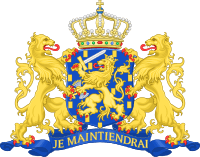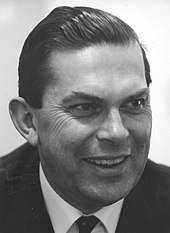First Biesheuvel cabinet
The First Biesheuvel cabinet was the cabinet of the Netherlands from 6 July 1971 until 9 August 1972. The cabinet was formed by the political parties Catholic People's Party (KVP), People's Party for Freedom and Democracy (VVD), Anti-Revolutionary Party (ARP), Christian Historical Union (CHU) and the Democratic Socialists '70 (DS'70) after the election of 1971. The centre cabinet was a majority government in the House of Representatives. It was the first of two cabinets of Barend Biesheuvel, the Leader of the Anti-Revolutionary Party as Prime Minister, with Roelof Nelissen of the Catholic People's Party and Molly Geertsema the Deputy Leader of the People's Party for Freedom and Democracy serving as Deputy Prime Ministers.[1]
| First Biesheuvel cabinet | |
|---|---|
53rd Cabinet of the Netherlands | |
  The installation of the First Biesheuvel cabinet on 6 July 1971 | |
| Date formed | 6 July 1971 |
| Date dissolved | 9 August 1972 (Demissionary from 19 July 1972) |
| People and organisations | |
| Head of state | Queen Juliana |
| Head of government | Barend Biesheuvel |
| Deputy head of government | Roelof Nelissen Molly Geertsema |
| No. of ministers | 16 |
| Total no. of members | 16 |
| Member party | Catholic People's Party (KVP) People's Party for Freedom and Democracy (VVD) Anti-Revolutionary Party (ARP) Christian Historical Union (CHU) Democratic Socialists '70 (DS'70) |
| Status in legislature | Centre Majority government |
| Opposition party | Labour Party |
| Opposition leader | Joop den Uyl |
| History | |
| Election(s) | 1971 election |
| Outgoing election | 1972 election |
| Legislature term(s) | 1971–1972 |
| Incoming formation | 1971 formation |
| Outgoing formation | 1972–1973 formation |
| Predecessor | De Jong cabinet |
| Successor | Second Biesheuvel cabinet |
 |
|---|
| This article is part of a series on the politics and government of Netherlands |
|
|
Local government
|
|
Related topics |
Term
Problems of the cabinet were the release of war criminals (three of Breda) and the increasing inflation, combined with a stagnating economy (stagflation). The decision to cut government expenses was not supported by DS'70, so the cabinet lost its majority in the parliament, resulting in Biesheuvel II.
Minister Stuyt, the first minister for environmental affairs, issued an urgency-note concerning the environment. In 1972, the first report from the Club of Rome was published, which showed that the environment is in a bad state worldwide and that resources will eventually run out.
The cabinet recognised the GDR and voted to allow China back into the United Nations.
Cabinet Members
| Ministers | Title/Ministry | Term of office | Party | |||
|---|---|---|---|---|---|---|
 |
Barend Biesheuvel (1920–2001) |
Prime Minister | General Affairs | 6 July 1971 – 11 May 1973 |
Anti-Revolutionary Party | |
.jpg) |
Roelof Nelissen (1931–2019) |
Deputy Prime Minister / Minister |
Finance | 6 July 1971 – 11 May 1973 |
Catholic People's Party | |
.jpg) |
Molly Geertsema (1918–1991) |
Deputy Prime Minister / Minister |
Interior | 6 July 1971 – 11 May 1973 |
People's Party for Freedom and Democracy | |
 |
Norbert Schmelzer (1921–2008) |
Minister | Foreign Affairs | 6 July 1971 – 11 May 1973 |
Catholic People's Party | |
.jpg) |
Dries van Agt (born 1931) |
Minister | Justice | 6 July 1971 – 8 September 1977 |
Catholic People's Party | |
.jpg) |
Harrie Langman (1931–2016) |
Minister | Economic Affairs | 6 July 1971 – 11 May 1973 |
People's Party for Freedom and Democracy | |
.jpg) |
Hans de Koster (1914–1992) |
Minister | Defence | 6 July 1971 – 11 May 1973 |
People's Party for Freedom and Democracy | |
.jpg) |
Dr. Louis Stuyt (1914–2000) |
Minister | Health and Environment |
6 July 1971 – 11 May 1973 |
Catholic People's Party | |
 |
Jaap Boersma (1929–2012) |
Minister | Social Affairs | 6 July 1971 – 19 December 1977 |
Anti-Revolutionary Party | |
.jpg) |
Chris van Veen (1922–2009) |
Minister | Education and Sciences |
6 July 1971 – 11 May 1973 |
Christian Historical Union | |
.jpg) |
Dr. Willem Drees Jr. (1922–1998) |
Minister | Transport and Water Management |
6 July 1971 – 21 July 1972 [Res] |
Democratic Socialists '70 | |
.jpg) |
Bé Udink (1926–2016) |
21 July 1972 – 11 May 1973 |
Christian Historical Union | |||
.jpg) |
Pierre Lardinois (1924–1987) |
Minister | Agriculture and Fisheries |
5 April 1967 – 1 January 1973 [Retained] |
Catholic People's Party | |
.jpg) |
Bé Udink (1926–2016) |
Minister | Housing and Spatial Planning |
6 July 1971 – 11 May 1973 |
Christian Historical Union | |
.jpg) |
Piet Engels (1923–1994) |
Minister | Culture, Recreation and Social Work |
6 July 1971 – 11 May 1973 |
Catholic People's Party | |
| Ministers without portfolio | Title/Portfolio/Ministry | Term of office | Party | |||
.jpg) |
Roelof Nelissen (1931–2019) |
Minister | Suriname and Netherlands Antilles Affairs (within Interior) |
6 July 1971 – 28 January 1972 |
Catholic People's Party | |
.jpg) |
Pierre Lardinois (1924–1987) |
28 January 1972 – 1 January 1973 |
Catholic People's Party | |||
.jpg) |
Dr. Kees Boertien (1927–2002) |
Minister | Development Cooperation (within Foreign Affairs) |
6 July 1971 – 11 May 1973 |
Anti-Revolutionary Party | |
.jpg) |
Jonkheer Mauk de Brauw (1925–1984) |
Minister | Higher Education and Science Policy (within Education and Sciences) |
6 July 1971 – 21 July 1972 [Res] |
Democratic Socialists '70 | |
.jpg) |
Chris van Veen (1922–2009) |
21 July 1972 – 11 May 1973 |
Christian Historical Union | |||
| State Secretaries | Title/Portfolio/Ministry | Term of office | Party | |||
.jpg) |
Jan van Stuijvenberg (born 1928) |
State Secretary | • Central Government Affairs • Local Government Affairs • Government Real Estate (within Interior) |
17 July 1971 – 21 July 1972 [Res] |
Democratic Socialists '70 | |
.jpg) |
Tjerk Westerterp (born 1930) |
State Secretary | • European Affairs • NATO Affairs • Benelux Affairs (within Foreign Affairs) |
17 August 1971 – 7 March 1973 |
Catholic People's Party | |
 |
Willem Scholten (1927–2005) |
State Secretary | • Fiscal Affairs • Tax and Customs Administration (within Finance) |
14 July 1971 – 19 March 1973 |
Christian Historical Union | |
.jpg) |
Fons van der Stee (1928–1999) |
• Local Government Finances • National Mint • Gambling Policy • State Lottery (within Finance) |
14 July 1971 – 12 March 1973 |
Catholic People's Party | ||
.jpg) |
Hans Grosheide (born 1930) |
State Secretary | • Integration • Immigration • Asylum Affairs • Privacy Policy • Prison Administration • Youth Justice • Rehabilitation • Prevention (within Justice) |
28 July 1971 – 11 May 1973 |
Anti-Revolutionary Party | |
 |
Jan Oostenbrink (born 1936) |
State Secretary | • Small Business Policy • Retail Policy • Consumer Protection • Tourism Affairs (within Economic Affairs) |
17 July 1971 – 11 May 1973 |
Catholic People's Party | |
 |
Adri van Es (1913–1994) |
State Secretary | • Personnel Affairs • Equipment Policy • Veteran Affairs (within Defence) |
14 August 1963 – 16 September 1972 [Retained] |
Anti-Revolutionary Party | |
.jpg) |
Koos Rietkerk (1927–1986) |
State Secretary | • Social Security • Occupational Safety (within Social Affairs) |
28 July 1971 – 23 April 1973 |
People's Party for Freedom and Democracy | |
.jpg) |
Kees Schelfhout (1918–1983) |
State Secretary | • Special Education • Early Childhood Education (within Education and Sciences) |
28 July 1971 – 11 May 1973 |
Catholic People's Party | |
.jpg) |
Dr. Roelof Kruisinga (1922–2012) |
State Secretary | • Transport Infrastructure • Water Infrastructure • Public Transport • Postal Service • Weather Forecasting Service • Environmental Remediation (within Transport and Water Management) |
28 July 1971 – 20 March 1973 |
Christian Historical Union | |
| Werner Buck (1925–2010) |
State Secretary | • Urban Planning • Public Housing • Spatial Planning (within Housing and Spatial Planning) |
17 August 1971 – 11 May 1973 |
Catholic People's Party | ||
.jpg) |
Fia van Veenendaal- van Meggelen (1918–2005) |
State Secretary | • Social Services • Unemployment Affairs • Poverty Policy (within Culture, Recreation and Social Work) |
28 July 1971 – 21 July 1972 [Res] |
Democratic Socialists '70 | |
.jpg) |
Henk Vonhoff (1931–2010) |
• Youth Policy • Environmental Policy • Nature Policy • Media Affairs • Culture Policy • Arts Policy • Recreation Affairs • Sport (within Culture, Recreation and Social Work) |
28 July 1971 – 23 April 1973 |
People's Party for Freedom and Democracy | ||
| Source: (in Dutch) Rijksoverheid | ||||||
- Retained this position from the previous cabinet.
- Resigned.
References
- "Ideeën van Drees jr. waren te afwijkend" (in Dutch). Volkskrant. 8 September 1998. Retrieved 1 May 2018.
External links
- Official
- (in Dutch) Kabinet-Biesheuvel I en II Parlement & Politiek
- (in Dutch) Kabinet-Biesheuvel Rijksoverheid
| Wikimedia Commons has media related to Cabinet Biesheuvel I. |